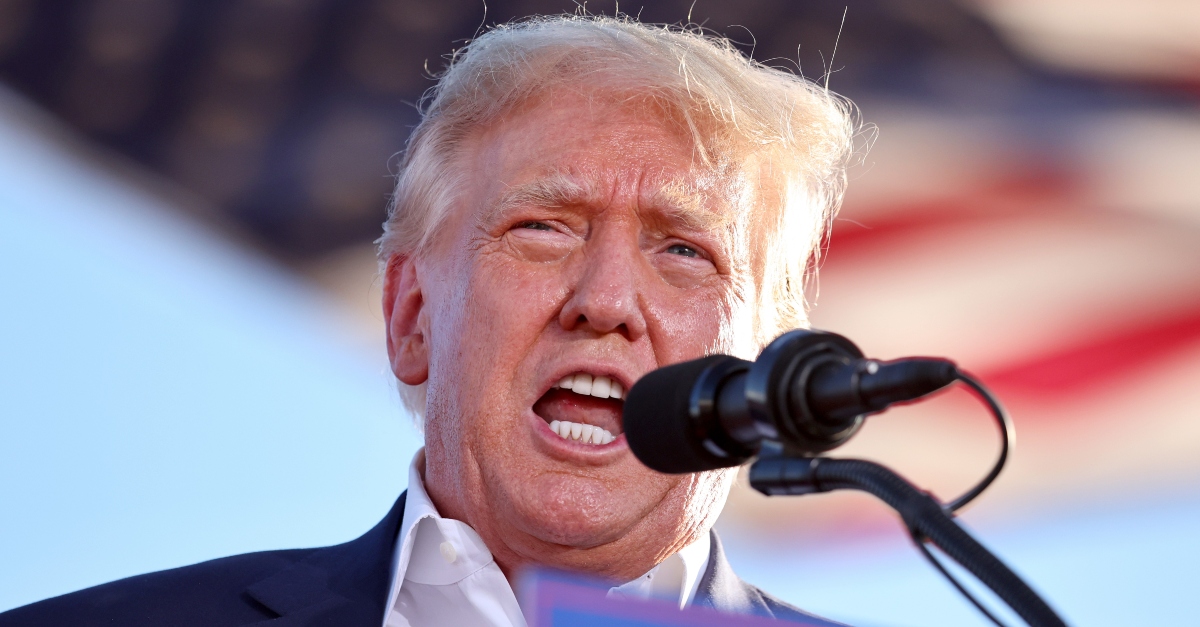
Donald Trump at October 09, 2022 rally. (Photo by Mario Tama/Getty Images.)
CNN has struck back at Donald Trump over the former president’s defamation complaint against the network.
In a motion filed Tuesday, CNN asked U.S. District Judge Anuraag Singhal to dismiss the Trump’s lawsuit.
As Law&Crime previously reported, Trump claimed that the network’s “persistent association” of Trump to Adolf Hitler and Hitler’s “Big Lie” — that Jews were the source of Germany’s problems — amounts to defamation.
CNN insists that the five CNN-published pieces at issue contain speech that is protected as both opinion and non-defamatory.
“The Complaint seeks to silence any criticism of Plaintiff’s debunked claim that the 2020 presidential election was ‘stolen,'” the motion says. “The lawsuit, though, does not even try to prove this claim is true, for the simple reason that evidence of material election fraud does not exist.”
CNN says that Trump’s claims are “untenable and repugnant to a free press and open political debate” and require dismissal under both Florida law and the First Amendment.
“The supposed ‘falsity’ (that ‘Big Lie’ allegedly conveys that Plaintiff would be ‘Hitler-like’ in any future political role and associates the Plaintiff’s character with that of Adolf Hitler) is unverifiable political expression,” the motion says. “The ‘Big Lie,’ a phrase widely used by not just CNN but many journalists and commentators to refer to Plaintiff’s unfounded claims of election fraud, and any alleged association resulting therefrom are also ‘rhetorical hyperbole’ and ‘pure opinion’ under well-established principles of defamation law.”
The 21-page motion also systematically takes aim at Trump’s claims using what it describes as a “roadmap” to guide the court to the conclusion that the lawsuit must be dismissed.
“Each [publication] is obviously ‘opinion’ in label, tone, and content,” CNN says in its motion (citations omitted). “The Complaint does not identify any specific falsity in any cited passage.”
As to Trump’s claim that portions of a Jan. 25, 2021 op-ed piece by Prof. Ruth Ben-Ghait, a CNN contributor, is defamatory, CNN argues that her use of the phrase “Big Lie” is “rhetorical hyperbole” and “does not refer to Hitler or Nazism.”
Ben-Ghiat’s op-ed, CNN argues, “does not state a literal fact that Plaintiff is Hitler or will literally implement policy programs from Nazi Germany.”
“Instead, Publication A uses ‘Big Lie’ as an expression of contempt for Plaintiff’s conduct,” the motion continues. “Thus, ‘Big Lie’ is the same as the ‘loose language or undefined slogans that are part of the conventional give-and-take in our economic and political controversies — like ‘unfair’ or ‘fascist’ — and is not a false statement of actual fact.”
“Such rhetorical allusions to history are not actionable,” the motion adds.
CNN argues that a July 5, 2021 editorial by CNN Editor-at-Large Chris Cillizza — in which Cillizza recalls the infamous line by Nazi propagandist Joseph Goebbels that “[I]f you tell a lie big enough and keep repeating it, people will eventually come to believe it” — doesn’t use the phrase “Big Lie” and is merely a comparison between two quotes.
Another Cillizza editorial, this time from Sept. 15, 2021, doesn’t refer to Hitler or Nazism, is “pure opinion,” and “contains no facts” suggesting whether Cillizza used the phrase “Big Lie” believing it was false.
CNN also argued that as to all allegations, Trump failed to submit evidence of “actual malice” on the part of the network, the required showing necessary in order to prove a defamation claim.
The network dismissed Trump’s “theory of falsity” in his lawsuit — specifically, his assertion that the phrase “Big Lie” is “understood by readers to refer to propaganda tactics espoused by Adolf Hitler” and, therefore, that readers “understand ‘Big Lie’ asserts as fact that Plaintiff has the actual ‘character’ of Hitler.”
“Both inferences are implausible,” CNN argues. “In the context of these specific Publications, average readers would not plausibly understand ‘Big Lie’ to be an allusion to the Nazis (as opposed to just a lie that is ‘Big’). “Moreover, average readers would not plausibly conclude that these specific publications assert Plaintiff actually ‘has the character’ of Hitler or would literally be ‘Hitler-like’ in any future political role.”
“Even if these inferences were plausible, the Complaint does not explain what is actually false about the alleged historical allusion,” the complaint adds.
CNN contemplated the actual impact of opinion writers linking Trump to Hitler, whose dictatorship over Germany from 1933 to 1945 caused the murders of at least 11 million people, including six million Jews.
Per the motion (citations removed):
There is no quantum of proof that can prove or disprove speculative conjecture on whether Plaintiff will be “Hitler-like” if elected to office again or whether Plaintiff’s “character” can be “associate[d] with that of Hitler.” Such conclusions are subjective assessments of the intangible: a perception of whether one’s mental or moral qualities (based on conduct and statements) align or do not align with the mental or moral qualities of historical figures.
[ . . . ]
Plaintiff’s allegation that he has been likened to Hitler or accused of “Hitler like” intentions does not identify a provably false statement of fact as a matter of law. Instead, whether Plaintiff’s character is “Hitler-like” is simply an idea, and “there is no such thing as a false idea. However pernicious an opinion may seem, we depend for its correction not on the conscience of judges and juries but on the competition of other ideas.”
Trump appointed Judge Singhal to the Southern District of Florida in 2019.
Read CNN’s motion here.
[Photo by Mario Tama/Getty Images.]